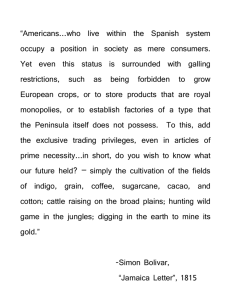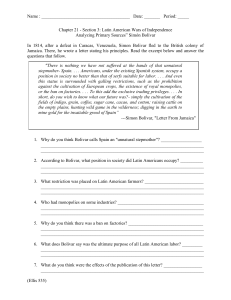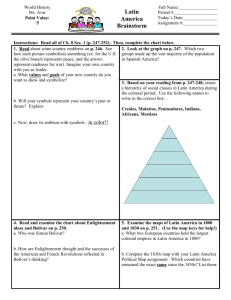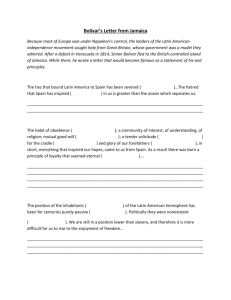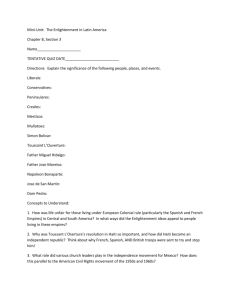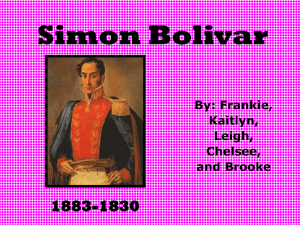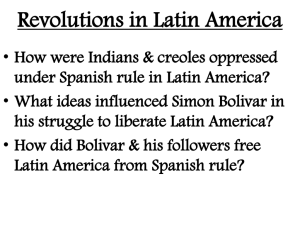What are the political roots of Latin American revolution?
advertisement
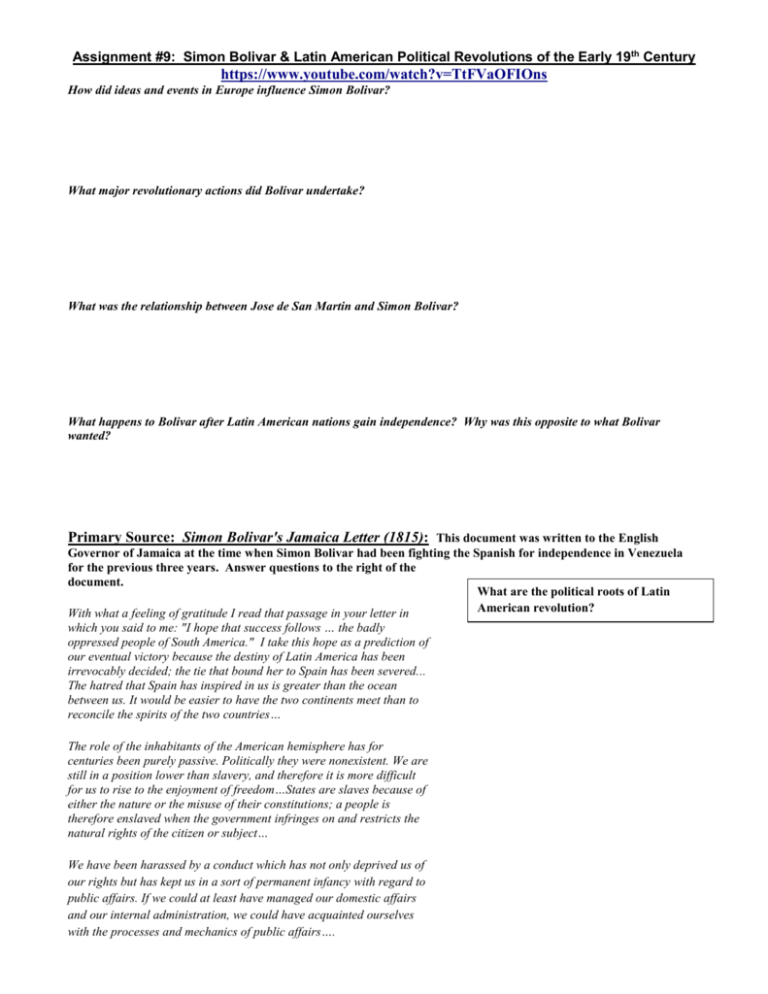
Assignment #9: Simon Bolivar & Latin American Political Revolutions of the Early 19th Century https://www.youtube.com/watch?v=TtFVaOFIOns How did ideas and events in Europe influence Simon Bolivar? What major revolutionary actions did Bolivar undertake? What was the relationship between Jose de San Martin and Simon Bolivar? What happens to Bolivar after Latin American nations gain independence? Why was this opposite to what Bolivar wanted? Primary Source: Simon Bolivar's Jamaica Letter (1815): This document was written to the English Governor of Jamaica at the time when Simon Bolivar had been fighting the Spanish for independence in Venezuela for the previous three years. Answer questions to the right of the document. What are the political roots of Latin American revolution? With what a feeling of gratitude I read that passage in your letter in which you said to me: "I hope that success follows … the badly oppressed people of South America." I take this hope as a prediction of our eventual victory because the destiny of Latin America has been irrevocably decided; the tie that bound her to Spain has been severed... The hatred that Spain has inspired in us is greater than the ocean between us. It would be easier to have the two continents meet than to reconcile the spirits of the two countries… The role of the inhabitants of the American hemisphere has for centuries been purely passive. Politically they were nonexistent. We are still in a position lower than slavery, and therefore it is more difficult for us to rise to the enjoyment of freedom…States are slaves because of either the nature or the misuse of their constitutions; a people is therefore enslaved when the government infringes on and restricts the natural rights of the citizen or subject… We have been harassed by a conduct which has not only deprived us of our rights but has kept us in a sort of permanent infancy with regard to public affairs. If we could at least have managed our domestic affairs and our internal administration, we could have acquainted ourselves with the processes and mechanics of public affairs…. Americans today, and perhaps to a greater extent than ever before, who live within the Spanish system occupy a position in society no better than that of serfs destined for labor, or at best they have no more status than that of mere consumers. Yet even this status is surrounded with galling restrictions, such as being forbidden to grow European crops, or to store products which are royal monopolies, or to establish factories of a type the Spanish themselves do not possess. To this add the exclusive trading privileges, even in articles of prime necessity, and the barriers between American provinces, designed to prevent all exchange of trade, traffic, and understanding. In short, the cultivation of the fields of indigo, grain, coffee, sugar cane, cacao, and cotton; cattle raising on the broad plains; hunting wild game in the jungles and digging in the earth to mine its gold -- all to satisfy the greed of Spain. What are the economic roots of Latin American revolution? It is harder, Montesquieu has written, to release a nation from servitude than to enslave a free nation. This truth is proven by ancient and recent history, which reveals that most free nations have been put under the yoke, but very few enslaved nations have recovered their liberty. Despite these convictions of history, South Americans have made efforts to obtain liberal institutions, doubtless out of that instinct to aspire to the greatest possible happiness, which, common to all men, is bound to follow in civil societies founded on the principles of justice, liberty, and equality. But are we capable of maintaining in proper balance the difficult charge of a republic? Is it conceivable that a newly emancipated people can soar to the heights of liberty, and, unlike Icarus, neither have its wings melt nor fall into an abyss? There is reasonable probability to bolster our hopes. More than anyone, I desire to see Latin America fashioned into the greatest nation in the world, greatest not so much by virtue of her area and wealth as by her freedom and glory. Although I seek perfection for the government of my country, I cannot persuade myself that the New World can, at this moment, be organized as a great republic. Since it is currently impossible, I dare not desire it; yet much less do I desire to have all America a monarchy because this plan is not only impracticable but also impossible. Wrongs now existing could not be righted, and our emancipation would be fruitless. The South American states need the care of paternal governments to heal the sores and wounds of despotism and war. What assistance does Bolivar hope to get from the British when Latin America gains independence? From the foregoing, we can draw these conclusions: The South American provinces are fighting for their freedom, and they will ultimately succeed. Some provinces as a matter of course will form federal and some central republics; some areas will inevitably establish dictatorships… When success is not assured, when the state is weak, and when results are distantly seen, all men hesitate; opinion is divided, passions rage, and the enemy fans these passions in order to win an easy victory because of them. As soon as we are strong and under the guidance of a liberal nation [England] which will lend us her protection, we will achieve in cultivating the virtues and talents that lead to glory. Then will we march majestically toward that great prosperity for which South America is destined.
